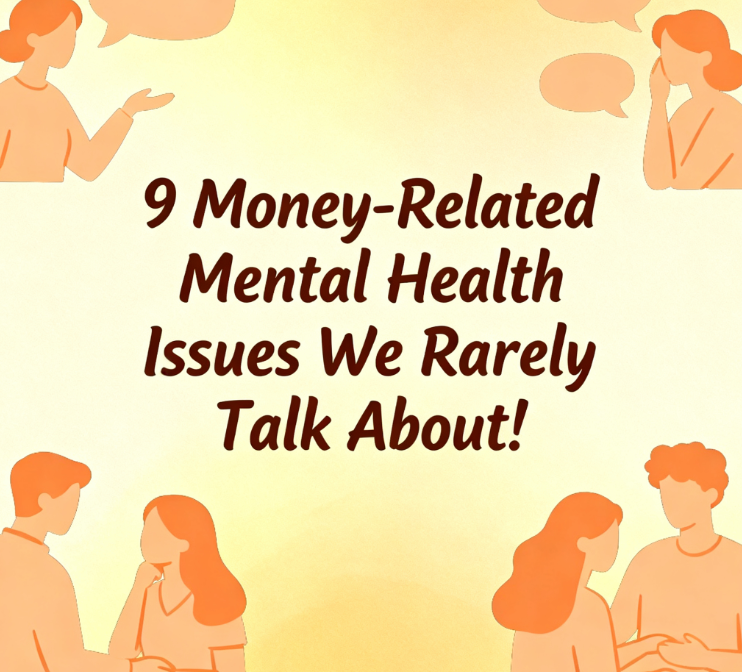What if your “financial habits” had less to do with numbers and more with psychology? This article sheds light on the often-overlooked mental health issues linked to money—issues that can shape your identity, relationships, and overall well-being.

Money is never just about money itself. For many of us, it stands for safety, control, freedom, love, and even self-worth. Yet the mental health struggles stemming from our relationship with money are frequently ignored, misunderstood, kept hidden, or written off as “poor financial habits.” In truth, money’s psychological impact runs deep, influencing how we think, feel, and act every single day.
Let’s explore some of the most underrecognized money-related mental health issues, why they matter, and how they affect our well-being.
1. Financial Shame
Shame surrounding money is widespread but rarely talked about. People feel embarrassed about being in debt, living paycheck to paycheck, or not having savings “for their age”—so much so that they rarely open up about it.A young professional hiding credit card debt might avoid money conversations with friends or partners, fearing judgment. Parents may feel guilty for not being able to afford the same luxuries for their kids that other parents can. This shame often leads to loneliness, making it harder to seek help or make rational financial choices.

2. Compulsive Behaviours
Money-related compulsions come in various forms:
- Overspending and shopping addiction: Using purchases to cope with loneliness, stress, or low self-esteem. The initial rush of dopamine fades quickly, leaving guilt and regret—and creating a harmful cycle.
- Workaholism: Identifying too strongly with productivity and income, where rest feels unsafe or “unearned.” Excessive exposure to hustle culture content can fuel this.
- Chronic underspending: Reluctance to spend money on necessities or joys, even when funds are available. This, too, can be an anxiety-driven compulsion.Each of these behaviours stems from deeper emotional struggles, not just “bad habits.”
3. Financial Denial
Financial denial is one of the most common yet least acknowledged psychological patterns tied to money. It shows up in actions like avoiding bank balances, ignoring bills until late fees pile up, or putting off tax filing.On the surface, this may look like laziness or irresponsibility. But in reality, it’s often rooted in anxiety. Looking at the numbers can feel overwhelming—or even threaten one’s sense of self-worth. Skipping these tasks might bring temporary relief, but it creates a vicious cycle of growing problems and more stress.
4. Scarcity Mindset
A scarcity mindset is a deeply held belief that “there will never be enough.” People with this mindset may save obsessively, work too much, or deny themselves small pleasures—even when they’re financially stable.For example, someone with a decent income might feel anxious about buying a cup of coffee, replaying thoughts of waste or future loss. This mindset often comes from childhood experiences of lack, where financial insecurity was tied directly to survival. Unfortunately, it stops people from enjoying the present or trusting their own ability to bounce back.
5. Financial Trauma
Just as people can experience trauma from broken relationships or accidents, they can also carry financial trauma. Someone who grew up in extreme poverty may feel intense fear of spending money—even when they’re financially secure.Survivors of bankruptcy, fraud, or sudden job loss may become hypervigilant, constantly on the lookout for financial threats. Financial trauma often shows up as rigid control (never spending a rupee unnecessarily) or compulsive overworking to avoid the risk of instability.
6. Anxiety and Sleep Disorders
The link between money and anxiety is clear, yet often dismissed. Financial worries—whether about debt, rent, or retirement—can lead to chronic stress, panic attacks, or insomnia. Even financially stable people may feel overly anxious, driven by fear of losing what they have.Sleep disruption is especially common: racing thoughts about bills or budgets keep people awake. Over time, this constant stress chips away at both physical health and decision-making ability.
7. Financial Enmeshment
Money can blur boundaries in families, creating unhealthy dependencies. A parent may rely on an adult child for ongoing financial support, putting guilt or emotional pressure on them. Conversely, children may feel obligated to rescue parents from financial crises—even at the cost of their own financial security.Financial enmeshment often comes from cultural expectations or family dysfunction. It frequently leads to resentment, burnout, and a sense of being trapped. Untangling these patterns takes courage, open communication, and therapeutic support.
8. Impact on Self-Worth
Many people unconsciously equate their self-worth with their net worth. Success, status, and value are often measured in financial terms. When someone loses a job, faces business failure, or struggles financially, they may also go through a deep identity crisis.Mainstream ads and social media reinforce this link. People start to feel inadequate if they aren’t “keeping up” with peers. These internalized beliefs can contribute to depression, low self-esteem, and social withdrawal.
9. Financial Paralysis

Modern life demands constant decision-making—and that includes finances: which credit card to use, which investment to choose, whether to rent or buy. For many, this leads to decision fatigue—a mental overload that makes even simple financial choices feel exhausting.Some people cope by avoiding decisions entirely, missing out on opportunities like early investing. Others make impulsive choices just to ease the pressure. Both responses can have long-term consequences, causing stress and regret.
So how do we deal with these issues? Here’s where to start: the more openly we talk about them, the less power they hold over us. Money conversations don’t have to be filled with secrecy or judgment. When we share our experiences honestly, we normalize the struggles, reduce stigma, and build stronger connections with those around us.
In the end, financial well-being isn’t just about numbers—it’s about the freedom to live without fear, the courage to ask for help when needed, and the confidence to know you’re not alone. The first step toward healing is simply being ready to talk about it.
Home
detail
9 Money-Related Mental Health Issues We Rarely Talk About!
2025-10-11T18:36:58
What if your “financial habits” had less to do with numbers and more with psychology? This article sheds light on the often-overlooked mental health issues linked to money—issues that can shape your identity, relationships, and overall well-being.

Money is never just about money itself. For many of us, it stands for safety, control, freedom, love, and even self-worth. Yet the mental health struggles stemming from our relationship with money are frequently ignored, misunderstood, kept hidden, or written off as “poor financial habits.” In truth, money’s psychological impact runs deep, influencing how we think, feel, and act every single day.
Let’s explore some of the most underrecognized money-related mental health issues, why they matter, and how they affect our well-being.
1. Financial Shame
Shame surrounding money is widespread but rarely talked about. People feel embarrassed about being in debt, living paycheck to paycheck, or not having savings “for their age”—so much so that they rarely open up about it.A young professional hiding credit card debt might avoid money conversations with friends or partners, fearing judgment. Parents may feel guilty for not being able to afford the same luxuries for their kids that other parents can. This shame often leads to loneliness, making it harder to seek help or make rational financial choices.

2. Compulsive Behaviours
Money-related compulsions come in various forms:
- Overspending and shopping addiction: Using purchases to cope with loneliness, stress, or low self-esteem. The initial rush of dopamine fades quickly, leaving guilt and regret—and creating a harmful cycle.
- Workaholism: Identifying too strongly with productivity and income, where rest feels unsafe or “unearned.” Excessive exposure to hustle culture content can fuel this.
- Chronic underspending: Reluctance to spend money on necessities or joys, even when funds are available. This, too, can be an anxiety-driven compulsion.Each of these behaviours stems from deeper emotional struggles, not just “bad habits.”
3. Financial Denial
Financial denial is one of the most common yet least acknowledged psychological patterns tied to money. It shows up in actions like avoiding bank balances, ignoring bills until late fees pile up, or putting off tax filing.On the surface, this may look like laziness or irresponsibility. But in reality, it’s often rooted in anxiety. Looking at the numbers can feel overwhelming—or even threaten one’s sense of self-worth. Skipping these tasks might bring temporary relief, but it creates a vicious cycle of growing problems and more stress.
4. Scarcity Mindset
A scarcity mindset is a deeply held belief that “there will never be enough.” People with this mindset may save obsessively, work too much, or deny themselves small pleasures—even when they’re financially stable.For example, someone with a decent income might feel anxious about buying a cup of coffee, replaying thoughts of waste or future loss. This mindset often comes from childhood experiences of lack, where financial insecurity was tied directly to survival. Unfortunately, it stops people from enjoying the present or trusting their own ability to bounce back.
5. Financial Trauma
Just as people can experience trauma from broken relationships or accidents, they can also carry financial trauma. Someone who grew up in extreme poverty may feel intense fear of spending money—even when they’re financially secure.Survivors of bankruptcy, fraud, or sudden job loss may become hypervigilant, constantly on the lookout for financial threats. Financial trauma often shows up as rigid control (never spending a rupee unnecessarily) or compulsive overworking to avoid the risk of instability.
6. Anxiety and Sleep Disorders
The link between money and anxiety is clear, yet often dismissed. Financial worries—whether about debt, rent, or retirement—can lead to chronic stress, panic attacks, or insomnia. Even financially stable people may feel overly anxious, driven by fear of losing what they have.Sleep disruption is especially common: racing thoughts about bills or budgets keep people awake. Over time, this constant stress chips away at both physical health and decision-making ability.
7. Financial Enmeshment
Money can blur boundaries in families, creating unhealthy dependencies. A parent may rely on an adult child for ongoing financial support, putting guilt or emotional pressure on them. Conversely, children may feel obligated to rescue parents from financial crises—even at the cost of their own financial security.Financial enmeshment often comes from cultural expectations or family dysfunction. It frequently leads to resentment, burnout, and a sense of being trapped. Untangling these patterns takes courage, open communication, and therapeutic support.
8. Impact on Self-Worth
Many people unconsciously equate their self-worth with their net worth. Success, status, and value are often measured in financial terms. When someone loses a job, faces business failure, or struggles financially, they may also go through a deep identity crisis.Mainstream ads and social media reinforce this link. People start to feel inadequate if they aren’t “keeping up” with peers. These internalized beliefs can contribute to depression, low self-esteem, and social withdrawal.
9. Financial Paralysis

Modern life demands constant decision-making—and that includes finances: which credit card to use, which investment to choose, whether to rent or buy. For many, this leads to decision fatigue—a mental overload that makes even simple financial choices feel exhausting.Some people cope by avoiding decisions entirely, missing out on opportunities like early investing. Others make impulsive choices just to ease the pressure. Both responses can have long-term consequences, causing stress and regret.
So how do we deal with these issues? Here’s where to start: the more openly we talk about them, the less power they hold over us. Money conversations don’t have to be filled with secrecy or judgment. When we share our experiences honestly, we normalize the struggles, reduce stigma, and build stronger connections with those around us.
In the end, financial well-being isn’t just about numbers—it’s about the freedom to live without fear, the courage to ask for help when needed, and the confidence to know you’re not alone. The first step toward healing is simply being ready to talk about it.